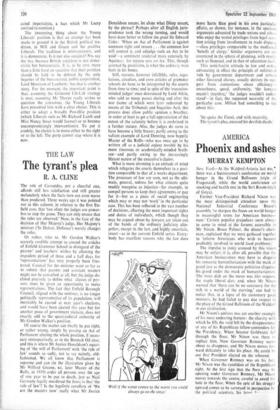The tyrant's plea
THE LAW R. A. CLINE
The role of Cassandra, not a cheerful one, affords still less satisfaction and still greater melancholy when the facts turn out even worse than predicted. Three weeks ago it was pointed out in this column, in relation to the first En- field case, that 'too often the judges are power- less to stop the game. They can only ensure that the rules are observed.' Now, in the face of the decision of Her Majesty's judge, Her Majesty's minister (In Defeat, Defiance') merely changes the rules.
Or rather, tries to. Mr Gordon Walker's scarcely credible attempt to amend the articles of Enfield Grammar School in disregard of the parents' and teachers' wishes by allowing the impudent period of three and a half days for 'representations' has very properly been frus- trated. Counsel for the minister went so far as to submit that parents and assistant masters might not be consulted at all, but the judge de- clined precisely to define what classes of per- sons must be given an opportunity to make representations. The fact that Enfield Borough Council, aligned with the minister, is no longer politically representative of its population, will inevitably be ejected at next year's elections, and would have been ejected this year but for another piece of government trickery, does not exactly add to the quasi-judicial authority of Mr Gordon Walker's position.
Of course the matter can finally be put right, or rather wrong, simply by passing an Act of Parliament altering the whole position, if neces- sary retrospectively, as in the Burmah Oil ease; and this is where Mr Justice Donaldson's equat- ing of 'the will of Parliament' with 'the rule of law' sounds so sadly, not to say naively, old- fashioned. We all know that Parliament is supreme and can (in the illustration given by Mr Wilfred Greene, KC, later Master of the Rolls, in 1935) order all persons over the age of one year to be put to death, just as Nazi Germany legally murdered the Jews; is that 'the rule of law'? Is the legalistic corollary of 'We are the masters now' really what Mr Justice Donaldson means, let alone what Dicey meant, by the phrase? Perhaps after all English juris- prudence took the wrong turning, and would have done better to follow the great Sir Edward Coke: 'When an Act of Parliament is against common right and reason . . . the common law will control it, and adjudge such an Act to be void'—a sentiment rendered more concisely by Aquinas: lex injusta non est lex. This, though- scorned by positivists, is what the ordinary man feels in his bones.
Still, statutes, however infallible, rules, regu- lations, circulars, and even articles of granionar schools do have to be interpreted by the courts from time to time; and ip spite of the 'executive- minded judges' once denounced by Lord Atkin, who sold so many passes during and after the war (some of which were later redeemed by means of the Tribunals and Inquiries Act), this process does allow public opinion a breather, in order at least to get a full appreciation of the extent of the calamity before it is enshrined in a further statute. Also, the judges do seem to have become a little braver, partly owing to the valiant example of Lord Denning, now happily Master of the Rolls—who was once apt to be written off as a judicial enfant terrible by his more timorous or academically-minded breth- ren—and partly owing to the increasingly blatant nature of the executive's claims.
What is more alarming is an attitude of mind which relegates the courts themselves to a posi- tion comparable to that of a works department. The processes of law are seen, not as the ulti- mate, general, redress for what citizens quite readily recognise as injustice—for example, to compel persons to keep their agreements or pay for it—but as a piece of social engineering which may or may not 'work' in the particular case. This has been reflected in the vast number of decisions, affecting the most important rights and duties of individuals, which though they may be argued about by lawyers are taken out of the hands of the ordinary judiciary alto- gether, except in the last, and highly uncertain, resort—as in the current Enfield series. Every- body has excellent reasons why the law does
more harm than good in his own particular affairs, as shown, for instance, in the specious arguments advanced by trade unions and others who enjoy the vested privileges from legal sanc- tion arising from involirement in trade disputes —class privileges comparable to the mediaeval 'benefit of clergy.' Similar arguments are en- countered in the sphere of planning, with results such as Stansted, and in that of education itself.
This semi-fascist attitude to law and order, advocating in effect the principle of unfettered rule by government department and certain other favoured classes, usually derives its sup- port from contentions about efficiency— smoothness, speed, uniformity, 'the lawyers mustn't interfere,' the judges wouldn't under- stand'—in fact, the supposed necessity of the particular case. Milton had something to say about this: 'So spake the Fiend, and with necessity, The tyrant's plea, excused his devilish deeds.'


































 Previous page
Previous page